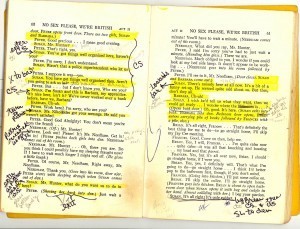How to Write a Ten Minute Play
 One of my best selling ten minute play is "The Bullies". A ten minute play is 10-15 pages in proper format. Sample.10Min.Play.Format It can have costumes and sets, certainly, but ten minute plays are most popular because of their simplicity. It's more attractive to the director, for economic reasons, if there are no sets, no costumes, ,and minimal props needed.
One of my best selling ten minute play is "The Bullies". A ten minute play is 10-15 pages in proper format. Sample.10Min.Play.Format It can have costumes and sets, certainly, but ten minute plays are most popular because of their simplicity. It's more attractive to the director, for economic reasons, if there are no sets, no costumes, ,and minimal props needed.
The shortness of the ten minute play does not sacrifice excellent writing and content for brevity. Less is more. And it is a great exercise for the writer to hone and edit their writing skills.
1. Format is very important. (see sample above) Buy a play script or go on line to check out a format. If you submit your new play to anyone they will not read it if it is not properly formatted. Notice that the character name is in CAPS and bold, followed with a period. Blocking (action) is in italics and always lower case if appearing in the 'line' of the actor. A 'beat' is a dramatic pause or to enhance the pace of the speech.
2. Each page represents approximately one minute of time on stage so your ten minute play must make every word count.
3. Leave lots of white space. One day when your play is being produced, actors will need a place to make notes in the script during  rehearsal. Here is a sample of an actor's (mine) working script. The actor's lines are highlighted and the director's blocking is written in the margins ALWAYS in pencil.
rehearsal. Here is a sample of an actor's (mine) working script. The actor's lines are highlighted and the director's blocking is written in the margins ALWAYS in pencil.
4. Blocking (in italics) is where you, as the playwright, sees the actors moving and when.
Sample.writing.Blocking But, keep it short and sweet. Remember there will be a director who has their own ideas of where he/she wants their actors to be. Be aware of costume changes in your writing. An actor can't exit stage left and enter stage right, seconds later, if you haven't written in the time it will take to give them the time to accomplish a costume change.
5. Your script has to work on a stage. If your story takes place in more than one locale, you have to be aware of the logistics of a 'set' change. So keep it simple to start. If you are ambitious in your setting buy a book on set design to research if your set is feasible. There are some wonderful 'envelope' sets that unfold when you need to change the scene. But you have to consider the budget; would a theatre have the money to build it? Always a worry. In the bullies, even though I have three different locales, there really is no set. The dialogue tells the audience exactly where my actors are. (without furniture or walls).
6. Dialogue: Now here's the sometimes tricky part: everything you want the audience to know, about the story and the characters, is conveyed in the dialogue. Unlike a short story or a novel, where you can write as much description as you'd like, a play script has none of that. NO description.
7. Cast: Always, always tell the reader/director/actor how many people are in the cast and their gender and ages. So in the beginning of your script you will have a 'character list' stating the character's name, who they are germane to the story, and their age and physical appearance. sample.charac.list.page
8. Actors: Ten minute plays usually have a small cast. If you write a script with six to eight to ten men in it, YOU ARE DOOMED. Men are extremely hard to cast (they're just not out there and if they are, their jobs and families prevent them from auditioning). So most directors are looking for a play with a reasonably small cast with more women than men.
9. Subject of your play: If this is your first play writing attempt, write about something you know. One of my early full length plays was based on my time as an actor in Hollywood. 
Maybe a family story. If it's pure fiction, make certain that it is sharp, sometimes funny, and always, excellently written!
PS. My web site is dedicated to helping new writers hone their craft. If you have questions, drop me a line. I always love to hear from readers and promise to answer you. T.S.



